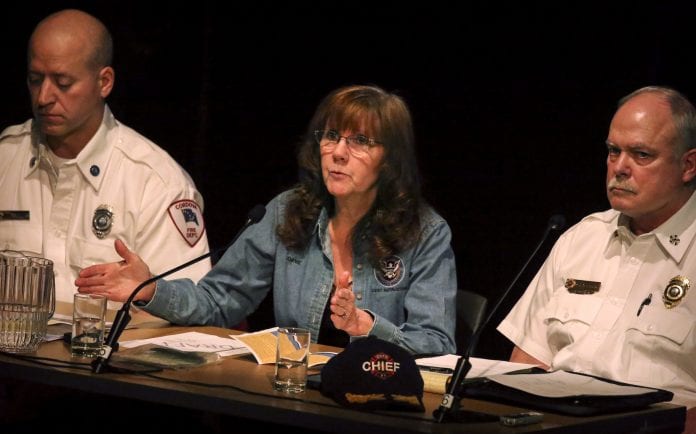
Tears welled up in her eyes as Emergency Coordinator Joanie Behrends thanked volunteers who had spent years training for earthquakes and tsunamis for responding as they did when the earthquake began on the morning of Tuesday, Jan. 23.
“It was pretty amazing to watch and be a part of,” she said.
Behrends was part of the panel of emergency responders at the debriefing on Tuesday, Jan. 30 to explain steps taken by the Incident Management Team, created in 2009, when the tsunami warning alert went out.
With her were Police Chief Mike Hicks, Fire Marshall Paul Trumblee, Cordova Community Medical Center CEO Scott Mitchell, City Manager Alan Lanning and Cordova School District Superintendent Alex Russin.
It took the Cordova Volunteer Fire Department only 20 minutes from the initial siren to gather and start moving their equipment from the fire department to their designated staging area at the Moose Lodge.
The Public Works street crews also began moving their equipment to higher ground, insuring that it would be safe if needed.
At 1:20 a.m. Cordova Community Medical Center’s CEO Scott Mitchell made the decision to evacuate CCMC.
“Well this was my first earthquake that I’ve felt in my life so this was an interesting time and honestly when it woke me up I didn’t think it was that big,” Mitchell said recounting his night on Jan. 23. “I decided, better look at my phone and see what the app says for the earthquake and then when I open it up, picked up the phone and was starting to try to find the app the alarm went off and scared the daylights out of me.”
It was then that Mitchell knew he needed to inform the hospital staff and start the evacuation process to the Little Chapel.

“We completely evacuated the hospital in less than an hour,” he said.
The hospital had 10 nursing home patients and eight hospital patients that night. Out of the 18 patients, only two were able to walk under their own power.
He also commended the 13 volunteers who showed up without being asked, and took seven truckloads of medical supplies, food, bedding, cots and patients to the Little Chapel.
“I’m just amazed at the resources this community has,” Mitchell said. “You should be proud of the systems that your community has. I’ve never seen a response like this.”
At Mt. Eccles Elementary School, Principle Gayle Groff had the doors open minutes after the first siren went off.
Cordova School District Superintendent Alex Russin said years of training and drills had paid off.
Snacks, cots, blankets and pillows were provided at the school as people gathered sharing stories with each other about their experience with the earthquake.
Trumblee has already asked the state for more sirens, noting the sirens in place did not work as well in the cold or with dense cloud coverage that occurred. By Tuesday, Jan. 30, a grant was submitted for a new radio system for dispatch, portable radios and four air monitors for ammonia leaks.
Since 2003, the city’s fire and police departments and volunteer efforts have received more than six million dollars in grants.
Behrends spent the majority of the debriefing emphasizing the importance of being prepared and survival kits to have ready.
The Homeland Security and Emergency Preparedness 7 Day Survival Kit features items such as water, soap, scissors, energy snacks, extra batteries and more.
Behrends also recommends having a Go-Kit or Bug-Out-Bag prepared for home and another for the car or office.
This bag should be easily portable and contain critical documents, irreplaceable items, nutritious food, water, first aid and medical kits, soap, prescriptions and medications as well as personal comfort items.
An individual photo of each family member should also be included in this kit.
More information from federal disaster planners is online at www.rady.gov.














